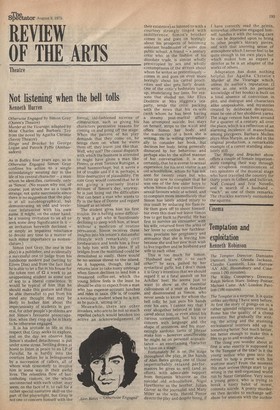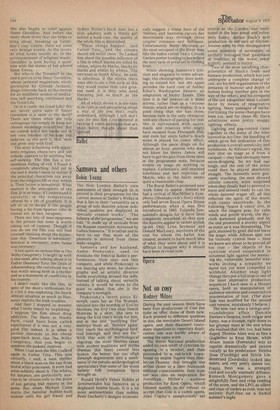Cinema
Temptation and exploitation
Kenneth Robinson
The Tempter Director: Damian° Damiani Stars: Glenda Jackson, Claudio Cassinelli, Lisa Harrow 'AA' ABC Bloomsbury and Cinecenta 1(95 minutes).
The Wilby Conspiracy Director: Ralph Nelson Stars: Sidney Poitier, Michael Caine. *AA" London Pavilion (100 minutes).
The Tempter is a surprise. It is quite unlike anything I have seen before. At first the story of goings-on in a rather splendid religious retreat in Rome has the quality of a cheap nevelette. But gradually the writing, the acting and the stunning ecclesiastical interiors add up to something better. Not much better, but better enough to make this a film to go to and wonder about.
The thing you wonder about at first is who exactly is supposed to be the Tempter of the title? Is it the young author who goes into the retreat to help a priest with his wartime story? From the moment this man arrives things start to go wrong in the well-organised world run by Sister Geraldine. Very soon a young prince, who is trying to break a nasty habit of incest, commits suicide. A pretty murderess then decides to exchange selfabuse for sessions with the author. She also begins to rebel against Sister Geraldine. And before the nasty show-down that she helps to bring about, breaking up Geraldine's cosy coterie, there are some very strange events. As the lovers do what lovers usually do, to the accompaniment of religious music, Geraldine is seen having a quiet kiss with the statue of her adored Sister Teresa.
But who is the Tempter? In the end it proves to be Sister Geraldine, whose personal magnetism, nicely portrayed by Glenda Jackson, drags everyone back to the retreat for an indefinite session of meditation, self-searching, confession and the Good Life.
Or is it really the Good Life? We are never quite sure if Sister Geraldine is ,a saint or the devil? There are times when she tells outrageous lies simply to keep her chosen weaklings around her. Bot we cannot tell if her lapses are in her own interest or because she believes, as she puts It, that 'men can grow only with God'.
The story is bursting with apparently-religious characters and yet nobody appears to be anything but self-seeking. The film has a tremendous feeling of evil. I found it completely absorbing. And yet in the end it doesn't seem to matter if the principal characters run away from the religious life or stay within it. Their future is immaterial. What matters is the atmosphere of the film. ,It is an essay, if 1 understand it correctly, in the temptations offered by a life of goodness. It is left to us to decide if the people having a far-from-Spartan time in retreat are, in fact, escapists, There are lots of near-epigrams in the picture but none is worth taking out of context. Though if you do see the film you will find yourself thinking about the injunction that 'Desertion is necessary; betrayal is necessary; even Judas was necessary.'
A not-quite-so-serious film is The Wilby Conspiracy. I caught up with it this week after talking about it to Father Desmond Tutu, the Dean of Johannesburg. He convinced me it was worth seeing both as a thriller and as a statement of conditions in his country.
I didn't really like the film, in spite of the dean's enthusiasm for it. I felt it was exploiting the South African situation as much as Hennessy exploits the Irish troubles.
And then I stopped to wonder what I really meant by 'exploiting'. I suppose the film about drug addiction, The Panic in Needle Park, could have been calledexploitation if it was not a very good film indeed. It is when a picture descends to the cheap paper-back level, like The Wilily Conspiracy, that you begin to question the makers' motives.
When 1 had seen the film I talked again to Father Tutu. This was certainly, I said, a neat thriller about a black man on the run from brutal white policemen. It even had some subtlety about it. The whites, for instance, are particularly anxious to be vicious only to the point of not getting bad reports in the press. But when Michael Caine starts the familiar bubble-bath routine with his girl friend and
Sydney Poitier's black man has a little adultery with a Hindu girl behind a book-case, the quality of the whole film is diminished.
'These things happen', said Father Tutu, land the cinema should mit *avoid them'. So I asked him about the possible influence of a film in which blacks are killed by whites, whites by blacks, blacks by blacks and whites by whites. 'The terrorism in South Africa', he said, 'is infectious. If the whites there were able to see a film such as this, they would realise their own greatest need. It is they who need liberating just as much as the blacks.'
All of which shows it is too easy to be cynical and patronising about a way of life you don't really understand. Although I still don't care for this film 1.r( commend it because it raises questions that are much better tha...glit about than ignored.



































 Previous page
Previous page